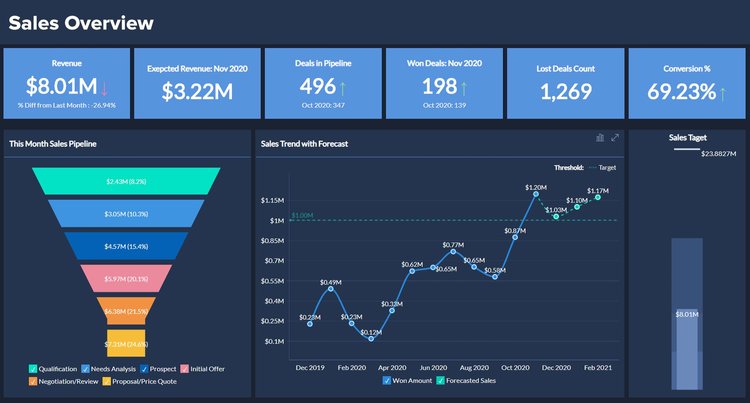Unlock the Power of Your Sales Data
What is Sales and Commercial Data Analytics?
10 KPIs of Sales and Commercial Data Analytics
How is Analytics Used in Sales and Commercial?
Improved Sales Performance
Improved sales performance involves using data analytics to gain real-time insights into sales activities and performance. Analytics helps track sales metrics, evaluate sales tactics, and identify opportunities for improvement.
Example: Implementing a sales dashboard to monitor key performance indicators (KPIs) such as sales growth rate and conversion rate, leading to more effective sales strategies.
Benefit: Enhanced visibility into sales performance enables faster decision-making and improves the effectiveness of sales efforts.
Optimized Commercial Strategies
Optimizing commercial strategies means using data analytics to streamline sales processes and maximize revenue. Analytics helps identify market trends, segment customers, and tailor sales approaches accordingly.
Example: Using customer segmentation to develop targeted marketing campaigns that resonate with specific customer groups, resulting in higher engagement and sales.
Benefit: Better commercial strategies increase revenue, improve customer targeting, and enhance overall sales performance.
Market Trend Prediction
Market trend prediction in sales involves using analytics to anticipate market changes and capitalize on emerging opportunities. Analytics can predict trends such as shifts in customer preferences or changes in competitive dynamics, enabling proactive management.
Example: Applying predictive analytics to forecast market demand for new products, allowing companies to adjust their sales strategies and product offerings.
Benefit: Proactive market trend prediction enables companies to stay ahead of competitors, adapt to changing market conditions, and seize new opportunities.
By leveraging sales and commercial data analytics, businesses can gain critical insights, optimize sales operations, and capitalize on market trends more effectively, leading to improved sales performance and competitive advantage.
CaseWhen's Innovative Approach
Unique Methodology for Sales Analytics
At CaseWhen, we redefine sales and commercial analytics with an innovative methodology that surpasses traditional approaches. Our blend of advanced data analysis techniques and industry expertise provides actionable insights that drive strategic sales decisions
Advanced Analytics Techniques and Industry Expertise
What sets CaseWhen apart is the integration of cutting-edge analytics with deep sales knowledge. This powerful combination offers a comprehensive understanding of your unique sales challenges and opportunities, enabling us to develop tailored solutions that deliver measurable results
Customized Solutions for Your Business
Recognizing that one-size-fits-all doesn’t work in sales analytics, CaseWhen designs customized solutions that align with your specific sales goals and requirements. Whether you need advanced sales forecasting models, customer segmentation strategies, or sales performance optimization, we ensure our solutions are tailored to meet your business objectives.
Tailored Strategies: Solutions designed to meet your specific sales needs.
Expert Insights: Leverage our deep industry knowledge for a competitive edge.
Proven Results: Enhance sales performance with data-driven decisions.
Unlock the full potential of your sales data with CaseWhen’s Data Analytics for Sales and Commercials Service. Let us help you transform insights into actionable strategies that drive your business forward.



